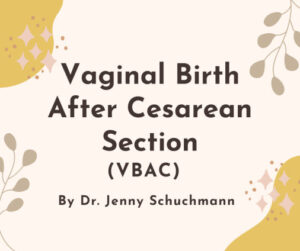
When a woman has had a c-section there are two options for how they deliver their next child. A patient can have either a scheduled repeat cesarean section or a vaginal delivery. A vaginal delivery is called a TOLAC (trial of labor after c-section) or a VBAC (vaginal birth after c-section). There are benefits and risks to both a repeat c-section and VBAC.
Benefits of a VBAC:
- Avoiding a major abdominal surgery
- A shorter recovery period
- Less risk for the development of an infection
- In general, there is less blood loss
- Avoidance of pregnancy problems in a future pregnancy. These are all very rare but having multiple c-sections increase the risk of injury to structures around your uterus (including your bladder and bowel), hysterectomy (removal of your uterus), and abnormal development of your placenta (such as a placenta accreta).
Although there are benefits to a VBAC there are also risks. One of the most severe risks is a uterine rupture. A rupture is when the prior c-section scar comes open. This is a medical and surgical emergency for both the mom and baby. If you are at high risk for a uterine rupture, then a c-section would be recommended. It is important that you have a discussion with your OB provider about whether you are high-risk or low-risk.
In women who have a uterine rupture, there is an increased risk of needing a hysterectomy at the time of your emergency c-section. With a uterine rupture, there is also an increased risk (compared to a scheduled c-section without a uterine rupture) of brain damage for the baby or the baby passing away. A uterine rupture occurs in 1% of women who are attempting TOLAC if their uterine incision was a “low transverse” incision. The risk of rupture for women with a different type of uterine incision is higher.
A VBAC should take place in a hospital where there are resources and staff who can manage life-threatening situations, such as a uterine rupture. Not all hospitals or Ob/Gyn providers will allow a patient to try for a vaginal delivery after a c-section. This can be due to a lack of 24/7 coverage by an anesthesiologist and Ob/Gyn physician. Our physicians at Ob/Gyn Associates provide 24/7 coverage for our patients who desire to try for a VBAC. We often see patients whose local hospitals or practices are unable to offer this option.
At Ob/Gyn Associates we are supportive of women who desire either a VBAC or repeat c-section. We are happy to review your pregnancy history with you to determine your personal risks and benefits of having a VBAC. One important piece of our discussion will be determining what type of incision was made on your uterus at the time of your prior c-section. This information can be found in a copy of your c-section operative report. We want our patients to be well-informed to make the best and safest decision for their delivery. Currently, we offer VBACs at the MercyOne downtown hospital in Des Moines.
We are accepting new patients! To schedule an appointment with OBGYN Associates, call us at 515-288-3287.
DISCLAIMER: All information on this website is provided for informational purposes only and is not intended to be construed as medical advice. OBGYN Associates shall not be liable for any errors or inaccuracies contained herein, or any actions taken in reliance thereon.

When a woman has had a c-section there are two options for how they deliver their next child. A patient can have either a scheduled repeat cesarean section or a vaginal delivery. A vaginal delivery is called a TOLAC (trial of labor after c-section) or a VBAC (vaginal birth after c-section). There are benefits and risks to both a repeat c-section and VBAC.
Benefits of a VBAC:
– Avoiding a major abdominal surgery
– A shorter recovery period
– Less risk for the development of an infection
– In general, there is less blood loss
– Avoidance of pregnancy problems in a future pregnancy. These are all very rare but having multiple c-sections increase the risk of injury to structures around your uterus (including your bladder and bowel), hysterectomy (removal of your uterus), and abnormal development of your placenta (such as a placenta accreta).
Although there are benefits to a VBAC there are also risks. One of the most severe risks is a uterine rupture. A rupture is when the prior c-section scar comes open. This is a medical and surgical emergency for both the mom and baby. If you are at high risk for a uterine rupture, then a c-section would be recommended. It is important that you have a discussion with your OB provider about whether you are high-risk or low-risk.
In women who have a uterine rupture, there is an increased risk of needing a hysterectomy at the time of your emergency c-section. With a uterine rupture, there is also an increased risk (compared to a scheduled c-section without a uterine rupture) of brain damage for the baby or the baby passing away. A uterine rupture occurs in 1% of women who are attempting TOLAC if their uterine incision was a “low transverse” incision. The risk of rupture for women with a different type of uterine incision is higher.
A VBAC should take place in a hospital where there are resources and staff who can manage life-threatening situations, such as a uterine rupture. Not all hospitals or Ob/Gyn providers will allow a patient to try for a vaginal delivery after a c-section. This can be due to a lack of 24/7 coverage by an anesthesiologist and Ob/Gyn physician. Our physicians at Ob/Gyn Associates provide 24/7 coverage for our patients who desire to try for a VBAC. We often see patients whose local hospitals or practices are unable to offer this option.
At Ob/Gyn Associates we are supportive of women who desire either a VBAC or repeat c-section. We are happy to review your pregnancy history with you to determine your personal risks and benefits of having a VBAC. One important piece of our discussion will be determining what type of incision was made on your uterus at the time of your prior c-section. This information can be found in a copy of your c-section operative report. We want our patients to be well-informed to make the best and safest decision for their delivery. Currently, we offer VBACs at the MercyOne downtown hospital in Des Moines.
We are accepting new patients! To schedule an appointment with OBGYN Associates, call us at 515-288-3287.
DISCLAIMER: All information on this website is provided for informational purposes only and is not intended to be construed as medical advice. OBGYN Associates shall not be liable for any errors or inaccuracies contained herein, or any actions taken in reliance thereon.





Leave A Comment